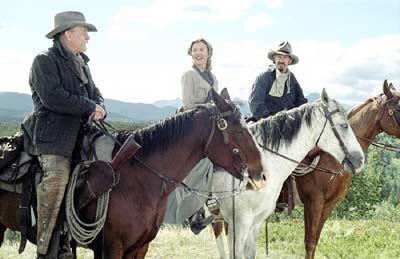

|
Open Range
4 out of 10 |
 |
|
Old-Time Western Even BBC TV in Britain used to have one evening a week for a Western movie. Sadly, though, this creature, once found so commonly roaming the plains of Hollywood has followed the buffalo before it into near extinction. Even so, despite anything that is said about Tinseltown, one fact endures the ravages of time: come rain or shine, Kevin Costner will be out making crummy flicks about the Kennedy's, baseball and cowboys whether anyone wants to see them or not.. His latest work, "Open Range" is a Western closely in the traditional style, right down to the baddies all riding black horses and the heroine on a white one. Based on "The Open Range Man" by Lauren Paine, it has at its centre Boss Spearman, a man who freegrazes his cattle, a legal activity that involved having herds permanently on the move as opposed to ranching where a person owns the land and keeps his cattle at the same location - an inevitable source of tension between those engaged in the two.activities. Shortly after passing one particular small town of Harmonville, the name of which neither Boss nor his men can remember, they realised that they will need supplies and send one of his men, Mose in to buy some. When he fails to return, Boss and his righthandman Wright are forced to follow Mose's footsteps back into town where they find him badly injured in jail. Worse, owning not only the saloon, a local rancher Baxter even has Poole the local Marshal in his pay and it soon becomes clear his intent to take Boss's cattle with help of his hired thugs. As the tension mounts and men from both camps are increasingly injured or killed, the freegrazing heroes quickly encounter Dr Barlow and his sister Sue who becomes the object of Wright's affection. "Open Range" was filmed on a native reserve in Alberta in Canada, not just for its unspoilt scenery with rolling hills under an ocean of blue sky, but also to cream off some tax dollars to allow Costner to recreate an entire period town with an available budget of just $10,000,000, microscopic in today's market. The attention to detail is incredible complete with the rough glass of the era which bows the image. Likewise, faithful to the weaponry of the 1800's, the actors have to withstand being thrown 6 feet or more from the simulated recoil of weapons like the Colt 45 and Winchester which were more like portable artillery than handguns. With Robert Duvall as Spearman and Costner as Wright in his usual homespun philosopher self it would seem the grounds for great things. Sadly, however, Michael Gambon as Denton Baxter always seems too avuncular to be threatening and as Costner's character says to Sue Barlow, "I don't care how old you are"...presumably repeating what he said to the wrinkly Annette Benning during casting. Indeed, at one point, Wright gives Sue a tea set and some candles, presumably for those cold winter nights when he can't be there, when a Zimmer walking frame would have been more appropriate. Furthermore, both the book and Craig Storper's screenplay are leaden with cliches in both dialogue and plot, that no rewrite by Costner could repair. As Wright says at one point, "There's nothing in this old town that's been a surprise" and indeed there isn't. Worse, sloppy writing has led to a slow and cumbersome juggernaut where, for instance, one Costner speech drones on, uninterrupted, over three scenes. For 2 hours and 19 minutes the movie grinds on before it reaches the inevitable gunfight, where miraculously, none of the heros are killed, but all of Baxter's are liquidated. The resulting savage slashing in the cutting room even to bring it to that length also left the movie in a permanent state of continuity breakdown with key explanatory scenes deleted, for instance, Baxter has 8 henchmen as he rides into town, but he's down to 7 by the time he arrives at the jail, a place where Baxter can clearly walk through walls as the person with the key has walked off. As the film closes with the ending
all guessed two hours before, it has mades it mark maybe more as a rarity
of a vintage bygone era, not only of the West, but more of the movie
industry that outgrew the genre.
Film Critic: Robert L Thompsett
|
|